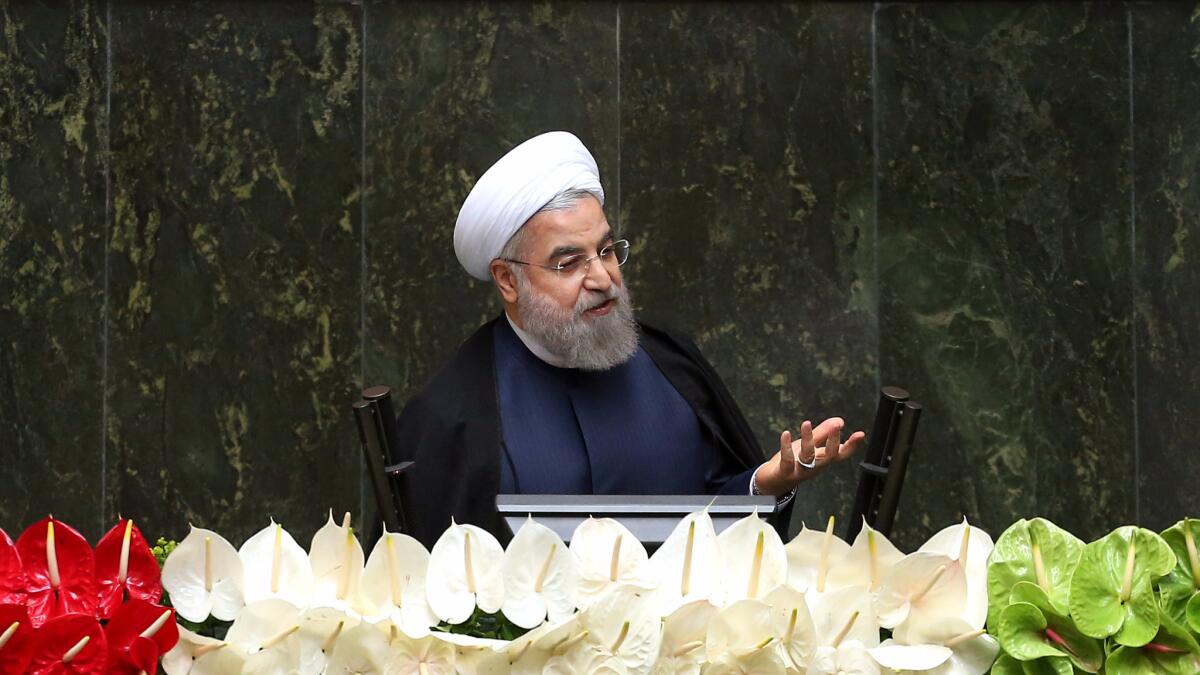Iran’s economy is running just fine — if you’re a bigwig at a state-owned company

Iranian President Hassan Rouhani speaks May 28 in Tehran.
- Share via
Reporting from Tehran — One Iranian newspaper has dubbed it “Payslip-gate.”
A series of leaks has exposed astronomical salaries among top executives at state-owned companies in Iran, a sign of persistent inequality in an economy struggling to recover from international sanctions.
The general director of state-run Bank Tejarat took home approximately $270,000 last year, according to one newspaper report this week. Another paper obtained a pay stub showing that an executive at the government-owned Iran Central Insurance Company pocketed $25,000 in one month – nearly 100 times the wage of the lowest-paid government employees.
Working stiffs everywhere believe their bosses are overpaid. But the disclosures carry particular significance in Iran, where egalitarianism was a mantra of the 1979 Islamic revolution, and where moderate President Hassan Rouhani has staked his administration on promises to improve ordinary citizens’ lives.
The general manager of the Iran Central Insurance Company, Mohammad Ebrahim Amin, resigned amid the uproar. A government spokesman apologized in a TV interview to “all people and colleagues” while calling on lawmakers to pass new regulations on executive pay.
Under Iranian law, no government employee can be paid more than seven times what the lowest paid worker earns.
The source of the leaks is unknown, but many observers believe they are aimed at undermining Rouhani as he prepares to seek a second four-year term next year. The stories have run in conservative and hard-line newspapers that oppose the president, prompting allegations that the leaks are aimed at embarrassing the government.
Health minister Hasan Qazizadeh Hashemi, a wealthy eye surgeon, described the leaks as “very ugly and politically motivated,” according to the semi-official FARS news agency.
Rouhani is under growing pressure to demonstrate economic gains from the landmark deal Iran sealed last year with Western powers to roll back its nuclear program.
While Iranians broadly supported the pact as a way of easing international sanctions and ending the country’s isolation, the economy has not recovered as quickly as many had hoped.
Unemployment remains stubbornly high at an estimated 11%. U.S. sanctions related to Iran’s ballistic missile program and human rights record remain in place, blocking trade in U.S. dollars. Austerity measures aimed at curbing rampant inflation have depressed state-driven industries, leaving many factories lying dormant.
While laborers in some state-run factories go months without receiving paychecks and stage regular protests in front of parliament in Tehran, a small elite continues to live large off of chronic mismanagement and cronyism in the bloated public sector.
Media reports said three managers at the insurance company together earned nearly $60,000 in a month earlier this year, while the average salary of a high school graduate is about $300 a month. The insurance company said the amounts included bonuses, family allowances and other perks in addition to salary – an explanation that did not diminish public anger.
See the most-read stories in World News this hour >>
“The public has this sense of endemic inequality in Iran – sometimes they see it in luxury cars, luxury apartments,” said Djavad Salehi-Isfahani, an economics professor at Virginia Tech University who studies Iran. “Whenever you get actual numbers put on those suspicions of inequality, naturally, people are interested.”
Mohammad Reza Zabalipour, a businessman and head of Tehran’s World Trade Center, said the leaks exposed the lack of meritocracy in Iran’s public sector.
“Many managers are enjoying vast salaries not because of their merits and qualifications but because of their connections to this or that politician or political party,” Zabalipour said. “And because they anticipate dismissal anytime, once they are at the helm of a state-run enterprise they do their best to fill their pockets as much and as soon as possible.”
With the election 12 months away, hard-liners loyal to Supreme Leader Ayatollah Ali Khamenei are reviving revolutionary rhetoric about distributing public revenues equitably.
In recent months, the ultraconservative camp has become more openly critical of the nuclear deal and argued that it has not delivered the economic benefits Rouhani’s government promised.
Iran’s central bank governor, Valiollah Seif, told an audience in Washington in April that Iran had expected quicker access to U.S. dollars and that “almost nothing” has happened.
Rouhani has ordered an investigation into the exorbitant salaries and said that any manager found to have been overpaid must refund the treasury. But even Rouhani’s allies acknowledge that his government bears responsibility for approving public sector pay while in office for the past three years.
Mostafa Farazmand, a 62-year-old insurance salesman who earns less than $900 a month after working for 35 years at the Iran Insurance Company, said the salaries showed the Islamic Revolution’s promises of economic equality were hollow.
“Every government in recent decades has justified the huge payments while the rank-and-file staff in insurance or any other state-run business – or in the private sector – are living hand-to-mouth and earn just enough to survive,” Farazmand said.
“The Islamic Republic of Iran claims to pay attention to social justice and fight inequality, but the gap between the haves and have-nots is greater than before the revolution.”
Special correspondent Mostaghim reported from Tehran and Times staff writer Bengali reported from Mumbai, India.
MORE NEWS FROM AROUND THE WORLD
It would take 1,166 Dodgers Stadiums to hold everyone displaced by violence and persecution
6 die in violent clashes between police and teachers union in Mexico
Follow @SBengali on Twitter for more news from South Asia
More to Read
Sign up for Essential California
The most important California stories and recommendations in your inbox every morning.
You may occasionally receive promotional content from the Los Angeles Times.











